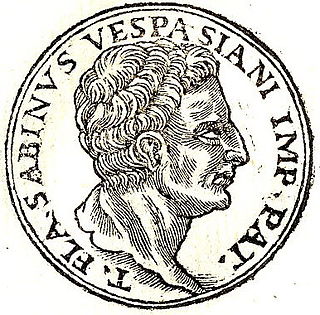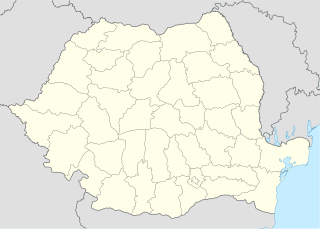This page is based on this
Wikipedia article Text is available under the
CC BY-SA 4.0 license; additional terms may apply.
Images, videos and audio are available under their respective licenses.

AD 79 (LXXIX) was a common year starting on Friday of the Julian calendar. At the time, it was known as the Year of the Consulship of Titus and Vespasianus. The denomination AD 79 for this year has been used since the early medieval period, when the Anno Domini calendar era became the prevalent method in Europe for naming years.
AD 51 (LI) was a common year starting on Friday of the Julian calendar. At the time, it was known as the Year of the Consulship of Caesar and Scipio. The denomination AD 51 for this year has been used since the early medieval period, when the Anno Domini calendar era became the prevalent method in Europe for naming years.
AD 74 (LXXIV) was a common year starting on Saturday of the Julian calendar. At the time, it was known as the Year of the Consulship of Titus and Vespasian . The denomination AD 74 for this year has been used since the early medieval period, when the Anno Domini calendar era became the prevalent method in Europe for naming years.
AD 76 (LXXVI) was a leap year starting on Monday of the Julian calendar. At the time, it was known as the Year of the Consulship of Titus and Vespasianus. The denomination AD 76 for this year has been used since the early medieval period, when the Anno Domini calendar era became the prevalent method in Europe for naming years.

Legio vigesima secunda Deiotariana was a legion of the Imperial Roman army, founded ca. 48 BC and disbanded during the Bar Kokhba revolt of 132–135. Its cognomen comes from Deiotarus, a Celtic king of Galatia. Its emblem is unknown.
Titus Flavius may refer to

The Flavian dynasty was a Roman imperial dynasty, which ruled the Roman Empire between 69 AD and 96 AD, encompassing the reigns of Vespasian (69–79), and his two sons Titus (79–81) and Domitian (81–96). The Flavians rose to power during the civil war of 69, known as the Year of the Four Emperors. After Galba and Otho died in quick succession, Vitellius became emperor in mid 69. His claim to the throne was quickly challenged by legions stationed in the Eastern provinces, who declared their commander Vespasian emperor in his place. The Second Battle of Bedriacum tilted the balance decisively in favour of the Flavian forces, who entered Rome on December 20. The following day, the Roman Senate officially declared Vespasian emperor of the Roman Empire, thus commencing the Flavian dynasty. Although the dynasty proved to be short-lived, several significant historic, economic and military events took place during their reign.

The gens Flavia was a plebeian family at Rome. Its members are first mentioned during the last three centuries of the Republic. The first of the Flavii to achieve prominence was Marcus Flavius, tribune of the plebs in 327 and 323 BC; however, no Flavius attained the consulship until Gaius Flavius Fimbria in 104 BC. The gens became illustrious during the first century AD, when the family of the Flavii Sabini claimed the imperial dignity.
The office of Roman Emperor went through a complex evolution over the centuries of its existence. During its earliest phase, the Principate, the reality of autocratic rule was masked behind the forms and conventions of oligarchic self-government inherited from the Roman Republic. The emperor had no specific office unless he chose to occupy the Republican office of consul.

Flavia Domitilla Major Flavia Domitilla the Elder or Domitilla the Elder was the wife of the Roman Emperor Vespasian.

See also Titus Flavius Sabinus (disambiguation) for other men of this name.

Arrecina Tertulla was a Roman woman that lived in the 1st century. She came from obscure origins and her family were of Equestrian rank.
Emperor Titus, Titus Flavius Vespasianus, later Titus Flavius Caesar Vespasianus Augustus, was Roman emperor from AD 79 to 81.
Titus is a Latin praenomen, or personal name, and was one of the most common names throughout Roman history. It was used by both patrician and plebeian families, and gave rise to the patronymic gens Titia. The feminine form is Tita or Titia. It was regularly abbreviated T.

The castra of Olteni was a fort in the Roman province of Dacia. It was built in the 2nd century AD. The archaeological site yielded coins issued by the Roman emperors Titus Flavius Vespasianus, Domitian, Trajan, Antoninus Pius, Elagabal and Alexander Severus. The fort was abandoned in the 3rd century. It ruins are located in Olteni in commune Bodoc in Romania.

Vespasianus Titus Tunnel, located in Samandağ, Hatay Province in southern Turkey, is an ancient water tunnel built during the Roman period.










